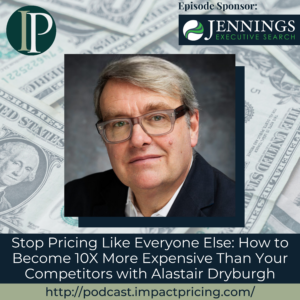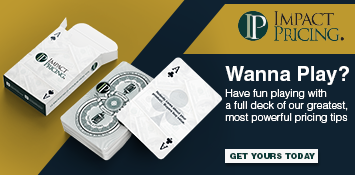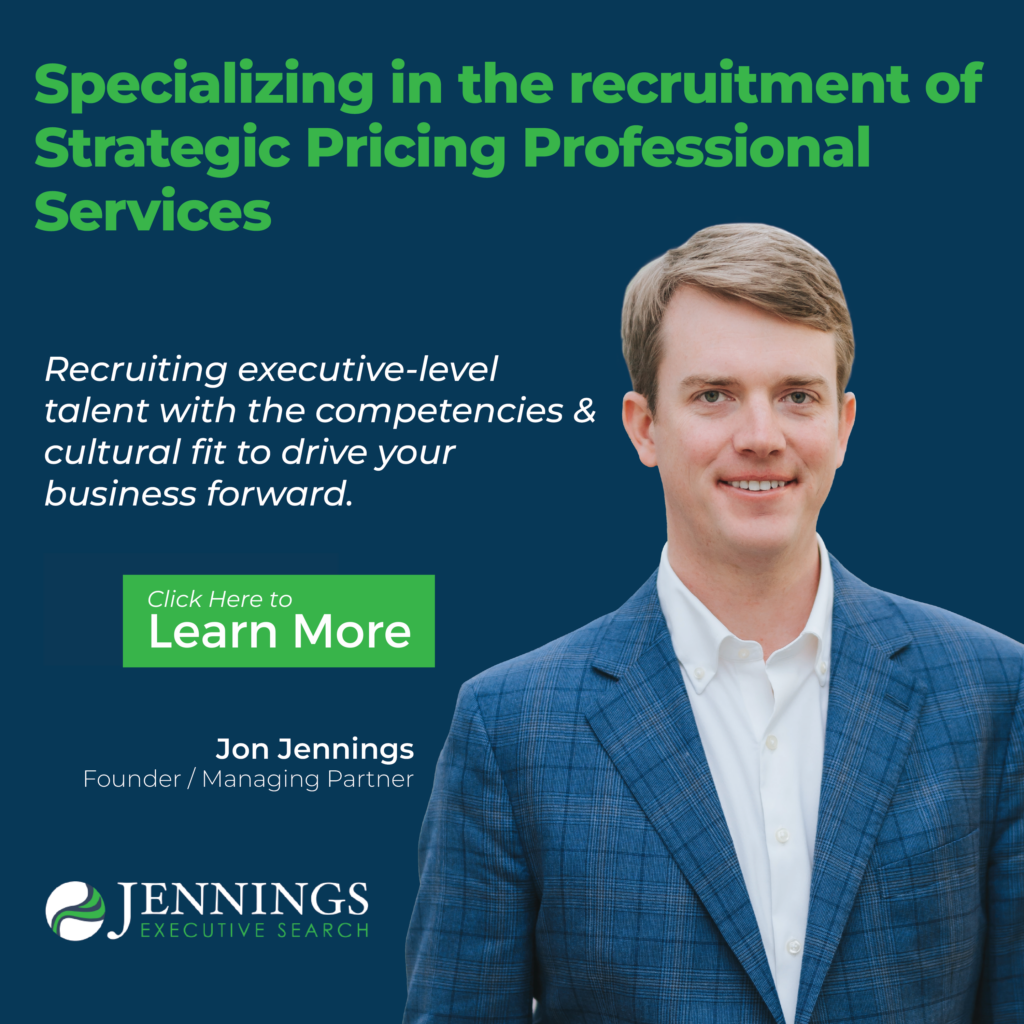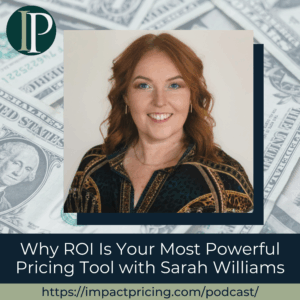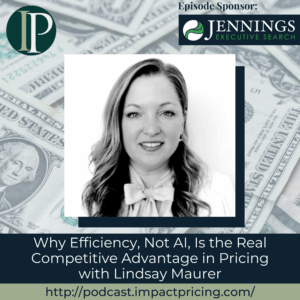Alastair Dryburgh is the Chief Pricing Architect at Intelligent Pricing Architecture and the author of the book “Pricing Genius.” With a background in commercial direction for a marketing consultancy in the pharmaceutical industry, Alastair has spent years honing his expertise in pricing strategies, particularly for creative agencies and consultancies. He believes in the power of value capture and the importance of differentiation in a competitive market.
In this episode, Alastair shares his insights on the significance of value over pricing, the necessity of focusing on unique offerings, and how consultants can effectively communicate their value to clients. Together, they discuss the challenges of pricing in a crowded marketplace and the impact of AI on consulting practices.
Podcast: Play in new window | Download
Why you have to check out today’s podcast:
- Discover how to capture value effectively in your pricing strategies.
- Learn the importance of differentiation in a competitive consulting market.
- Explore the relationship between pricing, value, and client outcomes.
“Consider seriously the possibility that you are ten times as good as your competitors in at least part of what you do, and you should not rest until you have found a way of getting paid in accordance with that.”
– Alastair Dryburgh
Topics Covered:
01:16 – Meet Alastair Dryburgh, a pricing expert with a unique background in the pharmaceutical industry.
01:55 – Discover the pivotal moment in the pharmaceutical sector that reshaped Alastair’s career.
05:22 – Learn why successful pricing hinges on value capture rather than value creation.
05:52 – Understand the oxygen vs. coffee analogy that clarifies the pricing dilemma.
07:37 – Explore the consultant’s dilemma of “Will I” vs. “Which one” decisions.
09:33 – Find out why many consultants appear the same and how to differentiate yourself.
11:04 – Uncover the proprietary process strategy inspired by McKinsey that can set you apart.
13:45 – Understand why specialization simplifies your business and enhances your appeal.
16:43 – Learn how to position yourself as the only choice for potential clients.
24:17 – Examine the impact of the AI revolution on consulting pricing models.
28:18 – Get final advice on recognizing and leveraging your 10x advantage in the market.
Key Takeaways:
“It’s about value capture, not value creation – you may be creating vast amounts of value but capturing only a tiny fraction of it.” – Alastair Dryburgh
“Every time I got more specialist, things got easier – your marketing becomes clearer and clients know immediately if they’re your target.” – Alastair Dryburgh
“If you’re using AI to reduce costs with a cost-plus pricing model, it will kill you – you’re just saving your way out of business.” – Alastair Dryburgh
Resources and People Mentioned:
- Intelligent Pricing Architecture: https://www.linkedin.com/company/intelligent-pricing-architecture/
- Pricing Genius (book): https://www.amazon.com/Pricing-Genius-Getting-Properly-Advice/dp/1908770783
- McKinsey & Co.: https://www.mckinsey.com/
Connect with Alastair Dryburgh:
- LinkedIn: https://www.linkedin.com/in/alastairdryburgh/
- Free resource: http://alastairdryburgh.com/guide/
Connect with Mark Stiving:
- LinkedIn: https://www.linkedin.com/in/stiving/
- Email: [email protected]
Full Interview Transcript
(Note: This transcript was created with an AI transcription service. Please forgive any transcription or grammatical errors. We probably sounded better in real life.)
Alastair Dryburgh
You should consider, seriously, the possibility that you are ten times as good as your competitors in at least part of what you do and you should not rest until you have found a way of getting paid in accordance with that.
[Intro / Ad]
Mark Stiving
Welcome to Impact Pricing, the podcast where we discuss pricing, value, and the imperfect relationship between them. I’m Mark Stiving, and I run boot camps to help companies get paid more.
Our guest today is Alastair Dryburgh. Hopefully I got that right. Here are three things you learned about Alastair before we start. He’s the chief pricing architect at Intelligent Pricing Architecture. He’s been running this for four years now. He’s the author of the new book, Pricing Genius. And believe it or not, he is the only chartered accountant who’s done a radio interview, well, on the topic of nuclear waste dumping. Welcome, Alastair.
Alastair Dryburgh
Lovely to be here. Thanks for the invite.
Mark Stiving
Ahh, it’s going to be fun. So how did you get into pricing?
Alastair Dryburgh
Well, it goes back quite a long time. This was 1994. I’d been working for the Pearson Group, a big media group, and I became commercial director of one of their subsidiaries. And this company was a marketing consultancy. It served the pharmaceutical industry.
And our big thing was, you’re a pharmaceutical industry, you’re about to launch what you hope is going to be a major new drug globally. And what we would do is we would dig through all your clinical trial results and see what sort of marketing messages we could pull out from them that could be backed up scientifically. So you might be able to claim that we have clinical evidence that our product is the product of choice if the patient has kidney failure.
And then we would write scientific articles to go in respected peer-reviewed journals to support these marketing claims. So you actually get, you know, proper published scientific support for your marketing, which is pretty powerful if you’re a pharmaceutical company. And we were getting along okay.
It was a difficult business to run because we employed people who had PhDs in life science and really understood pharmaceutical marketing, very rare combination as you can imagine. And it suddenly struck me when I woke up very early one morning, that here we are, we’re working with these companies, they’ve invested hundreds of millions in these new products, getting them to the point of being launched.
The difference between launching them well and becoming number one in the category and launching them badly and becoming number four is probably worth billions over the life cycle of the product. So we were in a similar position to say a big investment bank advising on some huge merger or acquisition, vast amounts at stake.
And so, I asked myself, why are we not as rich and powerful as Goldman Sachs, but instead spend our time arguing about the cost of an individual illustration with some junior product manager? And it was that that made me realize just how powerful and valuable professional services can be.
I moved on from that company, I did various other CFO jobs, then became an independent consultant, and I was doing business growth advice originally. But I realized that pricing was almost always the most important lever that we could find to pull, and that the consultancies and creative agencies, the people I call the creative and the ingenious people, were the ones I seemed to resonate with most. So, I basically just narrowed down my focus to those. So I now do pricing strategies principally, almost exclusively for creative agencies and consultancies.
Mark Stiving
You know what I find fascinating about the story you told, and by the way, I skimmed your book, which is very interesting.
And you and I think a ton alike, but what’s really fun is we use the word pricing a lot, but it really isn’t about pricing. It’s always about value. And so, I’m going to let you riff on that line a little bit. What do you think? Is it really value, or is it pricing?
Alastair Dryburgh
I think it’s value. One of the ways I talk about it is it’s about value. And if you want to use strategy speak, it’s about value capture, not value creation. To explain that in rather more straightforward language. An analogy I use is, I ask you, for instance, you know, what is more important to you, oxygen or coffee? That’s not a trick question. Oxygen, obviously.
Mark Stiving
Yeah, of course.
Alastair Dryburgh
Yeah. And then I ask, okay, well, how much did you spend on oxygen in the last month compared to how much you spent on coffee? And unless you’re a scuba diver or you’ve spent time in the hospital connected to oxygen, the answer probably is you spent a lot more money on coffee.
So why are you and everybody else spending so much more on something that you’ve just said is less valuable, less important to you. And it’s because you have to. Because the oxygen is available for free everywhere, pretty much. The coffee has to be paid for. And so, that’s another way of looking at this question of value capture. You know, it’s possible that you are creating vast amounts of value for your clients. But actually being able to capture, to be paid for, a tiny, tiny little fraction of that, which I would argue is an injustice.
Mark Stiving
Yeah. So I often think about, and I describe this a lot, as a ‘will I’ decision and a ‘which one’ decision. And so, I will use your example. And so, will I breathe today? Yes, I will breathe today. So which oxygen am I going to breathe? Well, I’ll take the free stuff that’s around me. So will I have a cup of coffee today? Yeah, probably. And so, which one am I going to have? And so, now I’m making a which one decision and I don’t get free coffee. I have to buy it someplace. And so, now I’m trying to choose which coffee do I want. So how do you apply this to a consultant or to a creative person?
Alastair Dryburgh
Right. And this is I think one of the big issues that the consultants and the creative people have is that if you know something about value-based pricing, and I think most of those guys are at least superficially familiar with it, you can answer the client’s ‘will I’ question, will I do something in this area? Will I get a consultancy to improve this? Will I get an ad agency to help me sell more of that?
And you talk about the value of doing that. And with a bit of practice, you can get good at communicating the value that you’re going to bring. But the problem is, that gets you to the point where you might actually get the client even more excited about doing this piece of work because you’ve opened their eyes to some other areas of value that you’re going to be creating, which is great.
But then when you get to the ‘which one’ decision, that’s where it goes wrong. Because if you can’t demonstrate that not just that you can create value but you can do something unique that they can’t get from someone else, then they may well think, yeah, it would make sense to pay these guys $100,000 to do this piece of work.
But there’s these other people who appear exactly the same who say they’ll do it for 50. And at that point as a client, I’d be almost irresponsible to choose the much higher fee if I haven’t got any proof that it will actually produce not just the result, but a superior result.
Mark Stiving
Yeah, I think that’s a great example or a great comment. And so, the question is, how do you do that, right? Everybody’s looking to say, hey, as a consultant, I’m different than that consultant. What’s really the driving factor there?
Alastair Dryburgh
Yeah, right. I mean, this is something that’s handled really, really badly. I think about, I know somebody who has a business and his business is effectively matching up creative agencies, marketing firms with clients. And it’s interesting that this whole choice needs someone to do it, to help them.
And he says quite often they get a brief coming in from a client, they want a particular piece of work, and there is, quote, no obvious agency. Which obviously doesn’t help when it comes to the point of pricing, because, you know, you want to be in a position where the client is thinking, oh, right, these guys can do this thing for me and nobody else can.
I have a friend who’s doing some, another organization development consultant. He was doing a piece of work with a big law firm in his city. And he said to me, he mentally thought his way along colmore road which is the street where all the big law firms have their offices and he went to all these firms websites. Pulled off the homepage of the website. blanked out the names, put them all together in a document, and said to his client, can you tell which one of these homepages belongs to which one of these firms? Can you even pick out yourselves?
And they couldn’t. And it is a huge, huge problem. Everybody looks so similar, but it doesn’t have to be that way. The way I generally advise people to deal with this is to talk about their proprietary process. So this is an idea I originally stole from McKinsey and Co., which probably is not a bad place to steal consulting ideas from.
Mark Stiving
Probably not. Yeah.
Alastair Dryburgh
So I had a client, a digital marketing agency, and they were doing something which was so they went to the very unsexy name, gap analysis, and it was a strategic analysis. My client described it to me, and I said, Simon, this is huge, you are identifying entirely new markets for your clients.
They were looking on social media and they were finding these large groups of people who were talking about things that nobody was saying anything useful about. They were asking questions that nobody was giving any particular good answers to. So there was this huge new completely untapped markets for that client and he was selling it as a set for three, four, five thousand pounds.
We looked at the way he was actually doing it and the process he was going through, and we identified that there were seven steps to it. And it wasn’t hard to make each step begin with C, so it turned into the seven C’s process, customer, channel, competition, commercials, and a few others.
And based on that, he was able to get the fee from a few thousand to 25,000 and then to 46,000 because he was now demonstrating, well, several things actually. If we’ve got the process worked out, we’ve obviously done this quite a lot of times, we’ve got experience. Which means there’s a high chance that we’ll actually produce a success for you and nobody else has this particular thing this particular way of doing the work. So he was able to increase his fee by pretty much ten times with the same client.
Mark Stiving
Yeah, what’s fascinating about that story is most of the time when I work with clients or companies, they’re afraid to focus.
And so, if I take the lawyer story that you told, you’ve got a bunch of lawyers out there that are saying, well, I can do pretty much anything. I don’t want to focus on that one specific thing. And as soon as I say, look, I’m really great at this one thing, that kind of implies I’m not great at everything else. So what do you think of that?
Alastair Dryburgh
I really, really strongly believe in focus. I have another client, a specialist PR firm, two very, very smart women. And they started off as a generalist PR firm and found it going quite hard. And then they specialized a bit and became a tech PR firm and it got easier. And then they specialized a bit more and became an enterprise technology PR firm.
And then they specialized again and became a pre-IPO enterprise technology firm. And she told me, every time they specialized things got easier. Because I think it’s much easier to believe that someone is really good at something than to believe that someone is really good at everything. And then, your marketing gets easier because you can, if you like, now I do LinkedIn ads so if you want to run an ad that says, you know, if you’re a consultancy or creative agency, are you frustrated with your pricing? Immediately people know whether they’re in that camp or not.
All your marketing gets so much easier. I could write a book about pricing for creative agencies and consultancies, which you said a few nice things about at the beginning. I would find it much more difficult to write a book about how to improve any sort of business at any stage of its lifestyle. So I think that the specialism, I mean, I’ll be honest, I resisted specialism at first, but I found just like my client who I mentioned, every time I got more specialist, things got easier.
The other thing to remember, of course, is that, you know, it’s not like the old days when your market, your available market, was how many clients lived within traveling distance of you. I do, I deliver all my consulting now online. So my market is English speaking world, except for Australia and New Zealand. That’s just because of the 12 hour time difference, makes things different. You might think I’m quite specialized in pricing for consultants and creative agencies, but according to LinkedIn, there are 240,000 people who are prospective clients for me.
Mark Stiving
Yeah. What’s fascinating is, I have friends who are pricing for accounting, but they have a very specialized niche within accounting as in, you want to learn to work less and make more money? I’ll help you do that. Right. So it’s really fascinating that the more you can niche down, the easier it is to find your clients.
Alastair Dryburgh
Yeah, absolutely. Yes.
Mark Stiving
Okay. So how do I make it look like I’m the only one? Does it have everything to do with this niche or is there something else?
Alastair Dryburgh
Well, there’s the niche question and then there’s the way that you package and present what you do. So going back to the example with the 10 times increase, we went there from the thing being a collection of really quite complicated spreadsheets of analysis to being the seven C’s process.
Another one of my clients, a brand strategist, his process had five steps to it, and he was able to turn it into an acronym, CLEAR, C-L-E-A-R, each of those standing for a particular step of the process. So you can make.
Mark Stiving
I want to push back on that a little bit if I may, right? So it doesn’t matter which one. Let’s talk clear because I could say clear easier than I could say seven C’s. So somebody walks in and says, hey, I have this clear program. And they say, well, what am I going to achieve with the clear program? And maybe the answer to that is we’re going to find new market segments where you can expand into. Great.
So I have a clear program to help you find market segments, but I’ve got other consultants out there who tell me they can help me find new market segments. They don’t use clear, but they have something else. But in the end, it’s that, what am I after? What am I trying to buy?
Alastair Dryburgh
Right. The other thing you can do with the framework, which is very powerful, is you can use it for proof. Now, I used to really struggle with this and people would ask me questions along the lines of, well, how are you going to do it?
Which is a fairly reasonable question, but if you try to answer that question in a naive way, well, I’m going to do this, I’m going to do this, then it’s a lose-lose situation because either you do manage to explain yourself very convincingly and then you’ve just told them exactly how to do the thing and they might go away and do it themselves. Or if you can’t, then you’ve just shot yourself in the foot. But what you can do, what you can do with a framework is say, okay, this is how we’re going to do it. And this is the first step.
And here are some examples of how the elements of the first step have produced results for businesses very similar to yours. And then we’ll do the second step. And here are some examples of how the elements in the second step have produced results for businesses very similar to yours and so on with the third step and on to the fourth and the fifth.
So it sets you apart partly by making you look different because no one else has got this particular way of doing it. But it also really helps you answer the question of, well, how do I know you’re going to deliver the goods?
Mark Stiving
Yup. Okay, so let’s talk about pricing consultants for a second. This will be fun, right? So as a pricing consultant, someone can walk into a billion-dollar corporation, and say, essentially, you know, look, if we could just improve your pricing 1%, we just made you $10 million.
Alastair Dryburgh
Yeah, yeah.
Mark Stiving
Shouldn’t you pay me a million dollars for that? And he goes, well, I appreciate the $10 million, but you know, there’s a consultant out there that’ll do this for $100k. Why would I pay you a million dollars?
Alastair Dryburgh
Yes. That is the point of setting yourself apart. The reason they would pay you a million dollars, and I’ll be candid, maybe a million dollars as against 100,000 might be too much of a stretch. Let’s say you would like to be paid 200,000 as compared to a competitor who would do it for 100,000.
So they would go with you. Main reason they would choose you is because they saw you as being more likely to produce the result. Cause you know, we’re making these promises where we’re selling the intangible in the words of a quite well known book. So we have got to think quite hard about how we persuade people that we can actually do the work.
So they would probably go for you if they felt that you are more likely to produce the results or more likely to produce a better result. There are also other things which we talk about, my clients and me, so did some work recently with a brand strategist and his thing is he’s got a big consumer brand maybe a food product and they spent a hundred thousand pounds on market research which has given them a huge amount of data, which needs to be interpreted. So it’s one thing to have a huge amount of data. It’s another thing to say, okay, this is what we need to be doing. This is the sort of thing that might work. This is the sort of thing that probably won’t work.
So his job is to go through this data and turn it into an action plan. And his difference is not the end result, the action plan. You know, he’s a very good brand strategist. But there are other good brand strategists out there who will produce an action plan that’s probably very similar.
His difference is that he will do it in a way so that every contact he has with anyone in the client he’s not just understanding analyzing the situation he’s also getting buy in. So if i’m his client i know there’s a big difference between being presented with a plan. Which nobody else really believes in all the arm twisting in the persuasion and negotiations and the wrangling that I need to get that plan implemented.
Whereas, if I go with Matt, he’s done that work for me. So I get a plan, but I also get something extra. I get a much, much faster and much easier implementation. And then, we actually put a figure on it. He reckons for the client that amounts to half a day a week that they can spend on their other priorities.
So I tend not to get that sort of implementation issue because I work with companies where I’m dealing with the owner and they’re relatively small. If you’re dealing with billion dollar corporations, then we know, and they know that actually getting people to change the way they do things is very hard work. It’s probably the most important thing.
Mark Stiving
Yeah, Alastair, fascinating by the way. But I want to change topics because I’m really fascinated and I almost always ask my guests nowadays about AI. In your thought, in your world, you’re in a unique position because you’re working with a bunch of consultants out there.
I got to say in the consulting world today, everybody’s terrified that AI is going to take their job away. Or even if it’s not going to take it away, people are going to try to use AI before they hire us. And so, it slows us down. It makes it harder for us. So what do you think about AI and this whole world of consulting and creative space?
Alastair Dryburgh
Yes, I think about it a lot. I think the first thing I would say is think very, very carefully about how your increasing use of AI is going to work with your existing pricing model. Because if you are using AI to get things done quicker.
And I remember one of my clients telling me, you know, pretty much everything he does, every time he needs to write something, he will start out with an AI draft. My wife develops legal training materials. She said she had to produce some materials. She uses AI for the first draft. So if you are using it to reduce costs, then if you have a cost plus pricing model, it will kill you.
Yeah, I mean, I got this from my wife. She’s a member of the California bar still from a previous career as a litigator in LA. And she pointed me to an opinion from the American Bar Association on the use of AI. And it’s very, very clear. Obviously, there are rules for using it and for supervising it. But they say, you cannot charge your clients for the time spent at learning how to use AI.
Some big law firms, they put a lot of money in training their associates, training their partners to supervise it, proprietary AI systems and everything, just so that instead of charging 100 hours of associate time each hour with its profit margin, they can now charge the client half an hour for putting some proofs and prompts into their AI. Clearly, this might finally be the final thing that persuades lawyers to get away from the concept of the billable hour, but it’s going to be an issue for an awful lot of people.
If you are using it to reduce costs, then you have got to have a model which doesn’t hand all that cost saving over to your client, otherwise you’re just saving your way out of business. I also suggest that, you know, the old saying, better, faster, cheaper, choose any two. And a lot of truth in that. But I think AI can potentially change that trade off.
So you could, in fact, thanks to AI, have better and cheaper and faster.
Mark Stiving
Yeah. So I use AI a lot just to talk to you about my ideas and hone some ideas. How do you use AI for your business?
Alastair Dryburgh
I am probably a relatively late adopter. I find it useful for getting a handle on the market and where people are. So I will ask it questions like, you know, what are the main reservations that people have about value-based pricing? That was very helpful.
I asked it to explain to me the principles of value-based pricing, not because I felt I needed help in that area, because I think it’s a good way of getting a sense of where people currently are.
And that was very reassuring because it confirmed my suspicion that pretty much all the value-based pricing discussion is about speaking more confidently about your value, which is step one. And there wasn’t any mention of steps two and steps three of my process, which was reassuring because it gave me some comfort that I did in fact have something, something novel there. So that’s probably where I’ve tended to use it.
Mark Stiving
Nice. Alastair, believe it or not, we are out of time. This has just flown by, but I am going to ask you the final question. What is one piece of pricing advice you’d give our listeners that you think could have a big impact on their business?
Alastair Dryburgh
If you are, all right, I would say, and this is definitely for consultancies and creative agencies. You should consider, seriously, the possibility that you are 10 times as good as your competitors in at least part of what you do. And you should not rest until you have found a way of getting paid in accordance with that.
Mark Stiving
I love that. That is a great piece of advice. I’m going to go take that one myself. How’s that?
Alastair Dryburgh
Yes, do.
Mark Stiving
Alastair, thank you so much for your time today. If anybody wants to contact you, how can they do that?
Alastair Dryburgh
Okay. Well, they can track me down on LinkedIn. My parents had no idea about this in 1961, but they gave me the perfectly search engine optimized name. I’m the only Alastair Dryburgh on LinkedIn or on Google, so no problems finding me there.
A better thing to do, though, would be to follow the link that you say you’re going to put in the show notes and you can get hold of a short 10 or 12 page guide on the process and how it works and you can start thinking about how you might apply it for yourself.
Mark Stiving
Yeah, what is that link?
Alastair Dryburgh
It is alastairdryburgh.com/guide.
Mark Stiving
Perfect. And we will put that in the show notes. Thank you so much, Alastair.
And to our listeners, thank you. If you enjoyed this, would you please leave us a rating and a review? And if you have any questions or comments about the podcast, or if your company wants to get paid more for the value you deliver, email me, [email protected].
Now, go make an impact.
[Ad / Outro]


